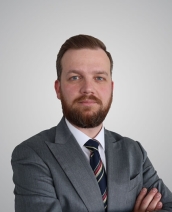Alexey Pankov
Partner
Alexey advises heavy industries and manufacturing clients on growth, performance, and digital problem-solving.

Areas of Focus
Education
Past Experience

Alexey is a Partner in our Dubai office. He is a member of our Performance, Energy & Resources, and Advanced Manufacturing teams. Alexey serves the Middle East and Global clients in the domains of strategic planning, operational transformation, supply chain development, digitally augmented problem-solving, and applied AI.
Since joining ADL in 2018, Alexey has been focused on driving strategic development and complex transformations in manufacturing, metals and energy sectors. He is dedicated to building long-term trust with clients and providing them with end-to-end support, from strategic decision-making to achieving tangible business performance results.
Prior to joining ADL, Alexey had led complex strategy, operational transformation, and investment programs for clients in the industrial manufacturing and financial sectors for over 12 years. He has gained experience with the corporate and public sectors. He has also worked in engineering positions in IT and software development companies.
Alexey holds a master’s degree in applied physics and mathematics from the Moscow Institute of Physics and Technology.

Balancing sustainability with value creation in metals & mining

Seabed mining: A $20 trillion opportunity

Winning the war for digital talent

Integrated planning in metals & mining

Alexey is a Partner in our Dubai office. He is a member of our Performance, Energy & Resources, and Advanced Manufacturing teams. Alexey serves the Middle East and Global clients in the domains of strategic planning, operational transformation, supply chain development, digitally augmented problem-solving, and applied AI.
Since joining ADL in 2018, Alexey has been focused on driving strategic development and complex transformations in manufacturing, metals and energy sectors. He is dedicated to building long-term trust with clients and providing them with end-to-end support, from strategic decision-making to achieving tangible business performance results.
Prior to joining ADL, Alexey had led complex strategy, operational transformation, and investment programs for clients in the industrial manufacturing and financial sectors for over 12 years. He has gained experience with the corporate and public sectors. He has also worked in engineering positions in IT and software development companies.
Alexey holds a master’s degree in applied physics and mathematics from the Moscow Institute of Physics and Technology.

Balancing sustainability with value creation in metals & mining

Seabed mining: A $20 trillion opportunity

Winning the war for digital talent

Integrated planning in metals & mining
More About Alexey
- Moscow Institute of Physics and TechnologyMaster’s degree in applied physics and mathematics
- Strategy Partners GroupAssociate Partner
